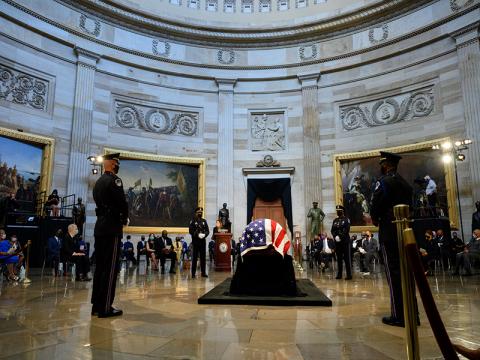
(TriceEdneyWire.com) – U. S. Rep. John Robert Lewis has crossed the Edmund Pettus Bridge for a final time. He made one final trip along Highway 80 from Selma to Montgomery Sunday, where he lay in repose in the Alabama State Capitol. Then, members of Congress received the flag-draped casket of Rep. Lewis at US Capitol Monday afternoon. After tributes from Democratic and Republican leaders, that was then placed at the top of the East Front of the Capitol for two days of public viewing.

Lewis will always be known as that college student in the buttoned-up trench coat and a backpack who was beaten and bloodied by the Alabama State Police as protesters crossed the Edmund Pettus Bridge in Selma in 1965.
From early Saturday in his hometown of Troy Alabama to his final celebration and burial Thursday, July 30, in Atlanta, the Lewis legacy will have sparked moments of racial reconciliation and thoughts among Blacks and Whites across the nation.
The Alabama trek of his final journey began in the Trojan Arena of Troy University and during an hour-long service where his brothers and sisters know Lewis only as “Robert,” who loved his family, and they loved him.
As a teen, Lewis couldn’t go to the library or attend Troy State because of his color. But on Saturday, people nodded their heads felt emotions as a singer performed Bette Middler’s “ Wind Beneath My Wings.
In life, Lewis could not check out books as a child of being admitted to Troy State because he was an African-American. In Selma, on March 7, 1965, an Alabama State Police Officer bashed his head in as he led a match across the Edmund Pettus Bridge.
But for two days, Alabama’s local, state, and federal leaders talked about Lewis as a son of the country who spent his life beyond Alabama bringing people of all races together, and his home state is better for it.
Alabama US Senator Doug Jones, Martin Luther King III, and Rep. Terry Sewell spoke during the service at Brown Chapel as well as survivors of “Bloody Sunday,” told during a service that took place before people got to view Lewis open casket.
Senator Jones said in the same way that Lewis risked his life in a journey for Freedom, ”that ride can’t end for us until we make it right” and Rep. Terry Sewell who represents Selma in Congress, said as a child she remembered how Coretta Scott King, Joseph Lowery, Amelia Boyington, and Lewis came back to Brown chapel and ”they sat over there.”
Quoting his father, Martin Luther King III, said men have to ask themselves specific questions when they make decisions, and John Lewis often asked was it is right.
“The ultimate measure was it right,” King said. “That’s who John Lewis was. He was always doing what was right from his heart. I saw him all of the time touch children. I had the opportunity to lead a delegation to India in 2009. I saw the Congressman there visiting the Gandhi sights because he personified non-violence.”
It was “just a few good men and women, the foot soldiers,” King III said during his speech. “Dad used to call them the ground crew. Ground crews used to do things you always didn’t see, but if it weren’t for them, there wouldn’t have been any victories.”
Members of Congress received the flag-draped casket of Rep. Lewis at US Capitol Monday afternoon. After tributes from Democratic and Republican leaders, that was then placed at the top of the East Front of the Capitol for two days of public viewing.
Rep. Lewis will be taken back to Atlanta on Wednesday, July 29, where he will lie in the Rotunda of Georgia State Capitol from 3:00 pm – 7:00 pm and from 8:00 pm to 8:00 am Thursday.
The final service for Lewis will take place at 11 am Thursday, July 30, at the Ebenezer Baptist Church Horizon Sanctuary in Atlanta, and Lewis will be buried at South-View Cemetery.
“While John Lewis represented the nation, he was my Congressman,” King III said at Brown Chapel. “And so I derived phenomenal inspiration from his example over and over again.”
Lewis hearse arrived at the US Capitol around 1:30 and among the staffers and former staffers were three women.”
Sitting out here in the heat can’t compare to the sacrifice that Congressman Lewis made on the Edmund Pettus Bridge, said Choneya Johnson, a policy analyst for Bread for the World, who used to work as a staffer in Congress. “We want to honor the Congressman’s legacy get out to vote on Nov.3.”
”No matter where he was going he always stopped and talked to the staff, ” said Andeline Jabbara, who works for DelegateStacey Plaskett of the US Virgin Island.
Rev.Grainger Browning, pastor of Ebenezer AME Church, offered the invocation during service Lewis in the US Capitol Rotunda.
In an interview after the service at the US Capitol, Browning said ”John Lewis exemplifies the none-violent life style that Dr. King posses more than any other disciple of Dr. King. He was beaten with bats, clubs and chats, but he kept an attitude of forgiveness for his entire life.”



